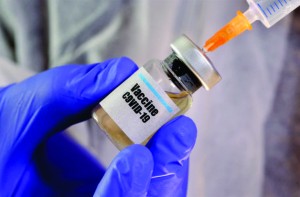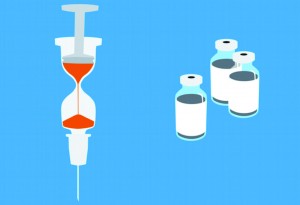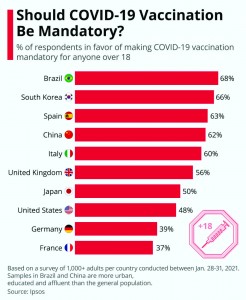Science and Public Trust
 It all began when Covid-19 struck early this year. Science wasn’t ready for it and all known medicines were useless. To add to the despair, the Centers for Disease Control and Prevention in America, as well as the World Health Organization (WHO), poured in buckets of confusion with contrary advisories, hurting science, like dams kill wildlife.
It all began when Covid-19 struck early this year. Science wasn’t ready for it and all known medicines were useless. To add to the despair, the Centers for Disease Control and Prevention in America, as well as the World Health Organization (WHO), poured in buckets of confusion with contrary advisories, hurting science, like dams kill wildlife.
Multi-speak in the press regarding the Covid vaccines, the claims and counter-claims, only aggravated the situation. This pumped up anti-science voices to a crescendo and all their past accusations about corporates cornering health services started sounding more legitimate. It began, they say, with medicines, and now it’s vaccines. When you sleep with dogs, you wake up with fleas.
This is one of the big issues that 2020 has raised on the back of the pandemic. If there are any doubts on this subject, consider the following: Vaccinations in the past were known by the scientists who created them. Jenner is remembered for small pox, Bordet and Gengou for whooping cough, Pasteur for rabies, Theiler for yellow fever, Enders along with Rose and Feldman for measles and, very recently, Gary Kobinger for Ebola. They were all imaged like Tintin’s Professor Calculus, other-worldly knowledge seekers.
In contrast, when it comes to Covid-19 vaccinations, the names going around are not of scientists but corporates: Pfizer, AstraZeneca, Moderna, Glaxo, and BioNTech, to name a few. There is not a single scientist that stands out; only giant pharmas showboating to their stock- holders. BioNTech’s fortunes, for instance, jumped by billions when its vaccine became news.
This is the major reason why there is contrary messaging on the vaccination front. Each corporate entity is trying to outdo the other, now there is vulgar nationalism too. As long as the pairing of business and politics was coquettish and covert, there was room to dismiss as alarmist allegations of romance between the two. Now it seems to be out in the open. The vaccination squabbles have aroused suspicions in the popular mind, including many who were once ardent believers in science and scientific institutions. Has science left the building after giving in to the market? The taxi was honking outside for a long time, but have scientists now finally boarded it? So, are they as fallible as the rest of us, white coats notwithstanding?
The vaccination squabbles have aroused suspicions in the popular mind, including many who were once ardent believers in science and scientific institutions. Has science left the building after giving in to the market? The taxi was honking outside for a long time, but have scientists now finally boarded it? So, are they as fallible as the rest of us, white coats notwithstanding?
Interestingly, headlines commending BioNTech and Pfizer for the scientific breakthrough with regard to messenger mRNA technology and T-cells research are not exactly deserving. Layers of corporate hurrahs hide the fact that the actual science behind this vaccine was done by actual people, namely by the Nobel Prize-winning duo of Rolf Zinkernagel and Peter Doherty.
Yes, a Turkish entrepreneurial couple, Ugur Sahin and Ozlem Tureci, established BioNTech, but the brains behind the vaccine need also to be acknowledged. Yes, BioNTech did the smart thing by including Zinkernagel in its scientific advisory committee. Its promoter, Ugur Sahin, also spent a year in Zinkernagel’s laboratory in 2000 and set up BioNTech soon after, that is, in 2008. BioNTech carries a happy political lesson too. It has brought colour back to the faces of the centrists and leftists in Germany. The couple that owns BioNTech is Turkish but based in Germany, therefore they are a good iron mitt to sock the far-right with. Germany can now take credit for the vaccine, but it’s the migrants, stupid! Open your doors.
BioNTech carries a happy political lesson too. It has brought colour back to the faces of the centrists and leftists in Germany. The couple that owns BioNTech is Turkish but based in Germany, therefore they are a good iron mitt to sock the far-right with. Germany can now take credit for the vaccine, but it’s the migrants, stupid! Open your doors.
The life story of Ugur Sahin and Ozlem Tureci is also a story of good capitalism; start from scratch and then grow so big that you begin negotiating in billions of dollars. There is no doubt that Sahin and Tureci are a great combination of learning and business skills. It is also true that without Zinkernagel and Doherty’s work, the Pfizer-BioNTech vaccine would never have happened.
As this aspect is not properly highlighted, the Pfizer-fronted vaccine comes through primarily as a corporate effort. The competition between the different trademarked vaccines, including Pfizer-BioNTech, in terms of their efficacy, has turned into a blatant expression of corporates in a cage fight.
This is evident from the way each vaccine company, from Pfizer to Moderna to AstraZeneca and many others, has made claims in the mass media. We have always known scientists to first put out their views in peer-reviewed publications. By and large, this remains true even today. This is why the public grandstanding around the vaccine is such a departure from past practice.
Not surprising then that the Covid-19 vaccine has made us think like a bunch of bookies; what are the odds at the counter? In the past, there may have been in-house lab backchat, but did we ever ask whether Jenner or Pasteur was besting somebody else in the stock market? Donald Trump made all of this much worse by accusing Pfizer of politics in the timing of its vaccine announcement.
Science has never been as distrusted in recent memory as it has in the times of Covid. The distrust has been growing but it has now reached a head with the vaccination claims. This is paradoxical; it is also an irony, but it is true. At the time when we need it the most, trust in science on the streets and in parlours has been rocked.
The steady erosion of trust in the health sector is inversely proportional to the rise in medical technology and the growth of pharma companies. People are living longer, yet doctors and drugs are under the scanner because health has become big business. Medicine, in fairness, has served us well; we are living longer, but business equals profit and will forever be suspect.
The single most important reason for the rising distrust in science is because governments today insist that research institutions pay their way. This is why some of the most revered scientific establishments, such as the National Institutes of Health and National Cancer Institute in the US, both responsible for major scientific breakthroughs, are now starved of state funds.
It is so widely believed that drug companies bribe doctors to do their bidding that in some countries medical practitioners must disclose if they have financial interests in pharma companies. This is also why governments keep a close watch on how evergreening of patents takes place to keep drug prices high. Recently, there was a spat on this issue involving Novartis.
The Pfizer vaccine, which should have been heralded worldwide, has instead met with a mixed reaction. The science behind the mRNA should have said it all; instead all kinds of past accusations against Pfizer have crawled out now that the log has been rolled. Its 1990s’ record in Nigeria along with the many legal cases it has faced, involving billions of dollars, is now big news.
This is obviously not good for science. Ugur Sahin of BioNTech, recalling his scientific past, candidly stated: “If you do a project with a large pharmaceutical company, sometimes you find out that the decision to continue the project isn’t based on the quality and potentiality of the research; it is more of a business strategy.” To equate science with business is bad for both.
In this fraught-with-suspicions atmosphere, science took a further wallop with Trump and the pandemic just heightened this fact. When it is the president of the United States, no less, who thumbs a nose at science, its repercussions are felt worldwide. Bushes that were burning unthreateningly now suddenly flare up and even sensible people fan the flames.
First, the White House raised a finger against WHO, but before long it was the whole fist that was being waved at scientists. When scientists said please worry, there is a pandemic out there, Trump said there was no reason to worry, it “will just go away”. Simultaneously, we didn’t know if masks should or should not be worn while the virus was calmly multiplying itself.
Nor are we certain whether doctors really understand the disease and whether there is any unanimity on how best to tackle Covid-19. Trump said Remdesivir cured him in five days flat, but later we were told that this may not be an accurate claim. Plasma therapy, too, was once believed to lessen the severity of the virus effect; now we are told that it is not so.
It is unfair to blame medical scientists entirely for they were uncertain as well. They too were crossing the river feeling the stones. What was, however, unprecedented, was how specialists were publicly contesting each other’s position on everything in the media. It was as if there was just not enough dirty linen for them to wash; the desire to be in the news was so compelling.
The way scientists and assorted experts fought over every inch of the way was rather unbecoming. What should have been discussed in specialised journals and seminars was being put out for public consumption without adequate peer review. Corporatisation of medicine encouraged this public display because funding for science now depends on public prominence.
Unfortunately, ultra-individualist activists in the West, who object to curbs on their movements by the state, including mask-wearing, to contain Covid, have joined this attack on science. This is why it is important that leaders come forward, as Joe Biden has done, and be among the first to take the new vaccine and show the world that science has won. We have several instances in history when vaccine inventors were the first to inject themselves to allay public fears.
Initially, we thought that the pandemic would have a different reaction. As we are all falling sick together, as the virus does not give a fig if one lives in a slum or in a gated community, it was hoped this would give a boost to public health. Indeed, in the early pandemic days we were clapping and banging pans to honour health workers, but soon that gave way to cynicism against science. Today, once again, public funding for health has lost its place in political discourse after dominating it briefly in the months of April and May 2020. The corporates have come back with a difference. Instead of striding to centrestage with mass adulation at their back, their public reception is laced with concerns of chicanery and deceit.
Today, once again, public funding for health has lost its place in political discourse after dominating it briefly in the months of April and May 2020. The corporates have come back with a difference. Instead of striding to centrestage with mass adulation at their back, their public reception is laced with concerns of chicanery and deceit.
That is not good news as the long-awaited vaccines, and the truth that they hold so much promise, are now suspect in the popular imagination. There were people who made fun of those who sang bhajans and recited the Hanuman Chalisa to fight Covid. Yet, they didn’t mean these incantations to replace science, but act as a supplement, as if to remind the gods.
The term ‘anti-vaxxers’ has now gained much wider currency than ever before. A survey conducted early this month, shows that 50 percent of New York firemen are among the newly converted anti-vaxxers. This should send warning bells clanging as they are frontline workers and, hopefully, this attitude will not spread to others who are also professionals of this kind.
There is the long run and the short run. The long run is to reinstate science as a non-corporate activity and fund disinterested scientists in non-profit laboratories. Cuts in these expenditures must be restored if the next generation is to benefit from the accumulated knowledge of centuries of scientific work. But that is the long run.
In the short run, the ‘beware of science’ writing on the 2020 walls needs to be replaced with the graffiti: ‘Science is good’.
 Jahangir's World Times First Comprehensive Magazine for students/teachers of competitive exams and general readers as well.
Jahangir's World Times First Comprehensive Magazine for students/teachers of competitive exams and general readers as well.


